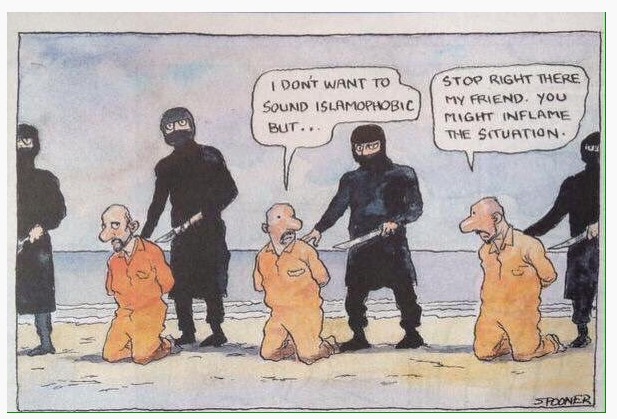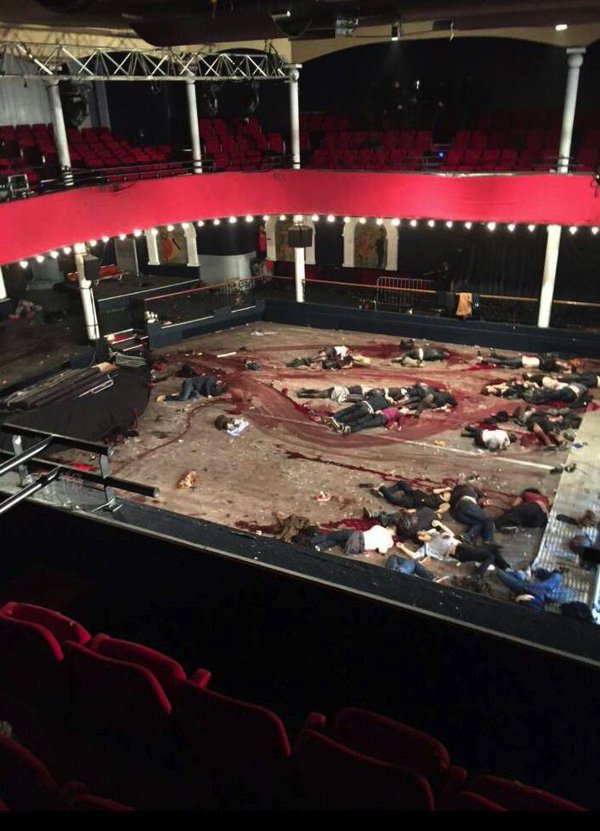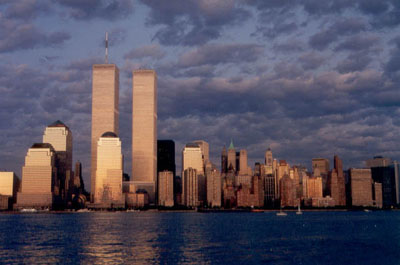I took to Twitter in the aftermath of November 13th’s horrific, barbaric Jihadist attacks on Paris and her people, rather than posting here. To my resigned dismay, I am at a loss to see what more can be said at this point, or what will change the state of deep denial about such things that we seem to be stuck in. It’s excruciating watching this horror recur so predictably, and I wonder, as I have for so very long now, what it will take for the West to wake up, stop making excuses for Jihadist atrocities, and really and truly stand up for its values.
The Charlie Hebdo massacre, less than a year ago, should have been more than enough to make that happen — as, to be honest, should any of the innumerable prior acts of Jihad against the West. Much of the world briefly united, declaring “Je suis Charlie!” in a sincere but symbolic defiance and resolve that evaporated after a time, ultimately returning us to our slumber. This time around, it was “Cette fois, c’est la guerre.” But that sentiment, too, has already faded, and it’s unclear to me that it will have any lasting consequence for our actions. Before the day was over, the usual suspects in the press were dutifully reinforcing The Narrative, wringing their hands about mythical anti-Muslim backlash that fits their perpetually low opinion of their countrymen, rebranding a deliberate, premeditated atrocity as a “tragedy”, and generally doing the enemy’s propaganda job for them. We’re back to rearranging the deck chairs. We’ve learned (or have we?) that “Holding hands for a feel-good photo opp. gets us nowhere in the fight against terrorism.” “In a month most of Europe will be back to giving cultural sensitivity training and talk of ‘war’ will be forgotten.” Lather, rinse, repeat.
As has been rightly said before: It’s not a wake-up call, if we go back to sleep. Mark Steyn’s reflection on the Paris attacks was among the most apt: The Barbarians are Inside, and There Are No Gates. James Delingpole’s assessment was likewise on target.
Whether or not we are interested in war with Jihadis, they have made quite clear, time and time again, that they are profoundly interested in war with us. Dreamy-eyed insistence on “peace” in the face of acts of war (which the iconic Eifel-Tower-recast-as-peace-sign graphic that circulated in the wake of the attacks seems to ask for) is an act of pure, blind surrender. Honestly, “It must be incredibly frustrating as an Islamic terrorist not to have your views and motives taken seriously by the societies you terrorize, even after you have explicitly and repeatedly stated them. … It’s like a bad Monty Python sketch” — one that would be funny, if the consequences weren’t so grave. It no doubt comes as quite a devastating surprise to ISIS that they are “not Islamic”.
“We in the West have reached such a low in self-esteem that we do the job of defeating ourselves even better than the enemy,” noted Allen West. Make no mistake, that low in self-esteem is by design — the result of dedicated work by many, over a long period of time. It’s been wrought by people who sincerely believe that we are worse than our enemies.
I’ve pleaded for an end to this willful blindness, as have others with far greater eloquence, dedication, and courage. By now, we’ve been shown more than enough to be able to see that shunned and vilified critics of the Islamic world like Pamela Geller, Robert Spencer, Tarek Fatah, Brigitte Gabriel, Ayaan Hirsi Ali, and others have been right to sound the alarm. “Tolerance” is all well and good in theory, but “When tolerance becomes a one-way street, it leads to cultural suicide.” You can’t tolerate people whose chief ambition in life is to kill you.

Below was the scene in the Bataclan Theater, where people were gunned down and tortured by having their stomachs slit open, where survivors pleaded for the lives of their loved ones and waited helplessly as tens of minutes went by, wondering whether they and theirs would be next to be systematically murdered by Jihadis who stood there, methodically reloading without any apparent fear of being stopped. It grieves me to have to post something like this. There is a temptation to look away. We mustn’t. This is the face and work of an enemy that will not relent until we decisively confront and unconditionally subdue its murderous, bloodthirsty army. This is utterly barbaric. There is no excuse for it. We must at long last find the moral courage to commit to decisive actions that match our ephemeral and easily uttered words of defiance, or those words will have had no meaning.

I mentioned the idea of an “escape sequence”, that in a theorized historic cycle might characterize the series of developments and preparations that lead to the pursuit and fulfillment of a new frontier. Sketching out an imagining of what such a thing might look like, here’s the rough framework of six sequence stages that I’ve come up with so far:
- Activation: Long-term observation persuades a sufficient number that their free society’s foundations are damaged beyond likely repair. Individuals begin to decide that escape to a new frontier is or will soon be necessary, activating a sort of failsafe protocol built into our human nature that has, time and again, kept the spark of our pioneering spirit alive. These individuals begin to find one another, form alliances, and devote their efforts to the next stage, with their goals and priorities adjusted accordingly.
- Logistics: Identification and assessment of suitable candidate frontiers. Methodical first-stage planning of possible transit mechanics, provisioning, necessary seed tech and hardware, resource availability and manufacturing and resource extraction/refinement potential at destination. Self-selection, networking, and training of first-wave pioneer crew. Development by same of colony’s charter, with careful safeguards designed to maximize the time before next sunset.
- Construction: Vehicle assembly, systems testing, launch site preparation, vehicle loading.
- Exodus: Liftoff, ascent, and transit.
- Settlement: Landing, temporary first-wave shelter. Construction of resilient permanent shelter. Resource surveys and first extraction and processing operations.
- Ignition: Productivity growth passes a key inflection point. Innovation and trade thrive freely in an unencumbered environment.
Where I see us right now is somewhere that spans Activation and Logistics. The ultimate goal is Ignition, with every preceding stage dedicated to its eventual achievement.
It’s a very bare-bones outline, to be sure. The last few stages in particular elide a tremendous amount of challenge and complexity. But it seems to be providing a useful framework for me to hang my thinking on, as I walk through what needs to happen to bring the next frontier within reach, and to ensure the greatest possibility of success. I’ll have refining and possibly rethinking this model in mind as I proceed with my search for answers.
It’s been the main question on my mind, and the central question of my life for a while now: If, as I’ve supposed, there’s a historic cycle wherein freedom-loving civilizations eventually succumb to rust, and those few who hold the population’s remnant of pioneer spirit must periodically seek a way out to a new frontier, and if the chain of developments and preparations leading up to the next exodus can be characterized as a sort of “escape sequence”, then what are the implications for those who seek a new frontier that is not yet within reach, and will likely not be within their own lifetimes? What does it mean to “be” escape sequence? What can individuals like us, who share a preference for the wide-open freedom of the frontier life, contribute to bringing the next frontier within reach for our posterity?
For me, it means I’ve got a job to do, and it’s been urgently important to me to figure out what that job is while there is still time for me to do it.
If I want to help realize the potential of a future frontier, and make movement to that frontier eventually possible, how will my efforts be most effectively spent? What field should I be working in? Aerospace engineering, perhaps? Any field of technology that might be relevant? What projects should I be working on? What’s not already being done that should be? What hasn’t even been thought of yet?
As part of this, I wonder: What kinds of preparations for exodus to a new frontier can even be usefully made or anticipated at this early stage? Speculative engineering? Supply logistics? Acquiring skills and assembling knowledge? What can we do today that will help things along years from now, and bring that future closer? Given the great difficulty of predicting the future, how much can we be reasonably sure of, or hope to influence by our actions now? Helping the next generation learn useful skills? By and large, the answers may be things we should be doing and will be doing anyway. But there must also be pieces of the puzzle unique to this calling and endeavor, that have to be identified and figured out. I’m in the process of finding those, in a search that has very much preoccupied my thoughts. As new possibilities and lines of thinking occur to me, and as I find new resources and work by others that sheds light on possible answers, I’ll be sure to post about those discoveries here.
Glenn Reynolds quotes Samuel Eliot Morison’s Admiral of the Ocean Sea: A Life of Christopher Columbus:
…a Spanish caravel named Nina scudded before a winter gale into Lisbon with news of a discovery that was to give old Europe another chance. In a few years we find the mental picture completely changed. Strong monarchs are stamping out privy conspiracy and rebellion; the Church, purged and chastened by the Protestant Reformation, puts her house in order; new ideas flare up throughout Italy, France, Germany and the northern nations; faith in God revives and the human spirit is renewed. The change is complete and startling: “A new envisagement of the world has begun, and men are no longer sighing after the imaginary golden age that lay in the distant past, but speculating as to the golden age that might possibly lie in the oncoming future.”
Reading this, I wonder whether the opening of another new frontier would (or will) have a similar effect on us today. I know better than to underestimate the forces of gloom and rust and the West’s painstakingly cultivated suicide wish. For those — probably few — who heed the call of new places and go, however, I think the revelation of a way out will be nothing short of transformative.
Indeed we should, as I’ve said before.
A stirring article by Nicole Gelinas in the New York Post, courtesy of Instapundit.











